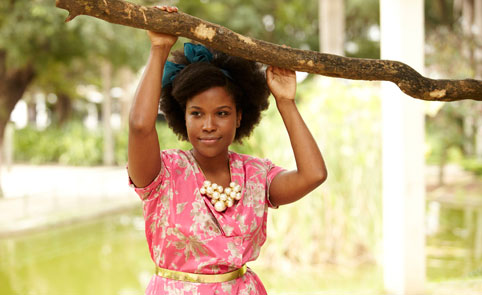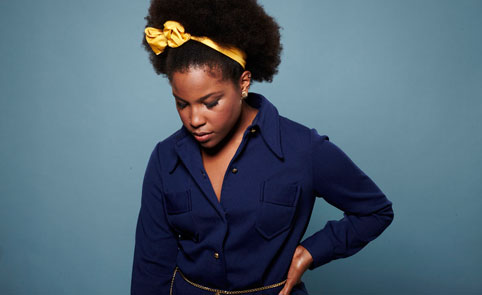
Depending on your point of view, Jesuton is either the luckiest lady in music or the embodiment of the old adage that fortune favours the brave. Either way, the deep love of Latin American music that brought the young English singer from East London to Brazil, via Peru, in early 2012 has helped her and her music receive the kind of exposure in just a matter of months that most artists can only dream of achieving their whole career. Even at the time of writing, with her album on iTunes and a week before the CD hits the shops, a quick Google search of her name reveals little more than a handful of camera-phone YouTube videos of her singing Adele and Amy Winehouse shot on the streets of Rio. Oh, and of course a certain performance on Caldeirão, the TV show hosted by her number one fan, Luciano Huck, that helped land her a record deal.
It was more than the Saturday afternoon prime time TV show at work, however. It transpired that the same day Huck introduced Jesuton to the president of SomLivre, the label of another rising young star Silva, he had already received several calls about this young singer busking in Rio. "My phone just started ringing, and there was all these people talking in Portuguese and I couldn't understand what they were saying, but on the big things, everything just came together," she says in her label headquarters in Botafogo, with an expression that occasionally looks like she still can't quite believe she has a 'label headquarters'.
"A producer, Rodrigo Vidal, got in touch with me so we were talking, and it turned out SomLivre had been thinking of him for me too. I'd been in Brazil for two months at that point, I didn't know what was a good move and there were all these offers, but it all seemed to come together."
Of course, you have to put yourself out there for these things to 'just come together'. Born and raised in Walthamstow, East London, of a Nigerian father and Jamaican mother, music was a big part of her childhood as evidenced by the soaring cover of Rolling Stones' 'Wild Horses' on the album. "I had one thing clear in my mind and that was to make music in Latin America, and for some reason it really didn't interest me to make music in London," she says. "Since living in Peru I was really blown away by guitar-based, really textured, arpeggio-laden sounds like Silvio Rodriguez, Cuban music and the Troubadour movement which is basically Dylan-style music but with a really textured, finger-picking style of playing guitar. Think of classical guitar playing but with strong political or social lyrics and really beautiful melodies. That was the kind of music I wanted to make."
Living in London and saving enough to get to Brazil merely underlined her desire to "go to where people are making that music, rather than be a fringe thing in London", and to absorb the vibrance that was the inspiration behind the original sound that she adored. Not that she had a particularly deep knowledge of Brazilian music.
the vibrance that was the inspiration behind the original sound that she adored. Not that she had a particularly deep knowledge of Brazilian music.
"I've found the musical world here is just enormous, there are so many genres and sub-genres. A friend lent me about 100 classic CDs to go through and that's really exciting, i've always enjoyed discovering new music. In London there's this production line of bands always coming out... here there's this universe where everything gets cross-pollinated, there's always something different and nothing is static. That's really stimulating."
For someone forced into learning the music business ropes so fast, the idea of entering a studio for the first time and it to be filled with experienced Brazilian musicians was also challenging. Covering largely English-language songs, a couple of Brazilian ones, and also re-writing a classic into English (Cássia Eller's 'Nós'), and communicating how she wanted them to sound isn't easy in a common language, so Jesuton was forced to rely on her ability to sing the melodies she wanted, and the musicianship of those around her. "I had to get over myself a bit," she admits.
"The Muse track ('Time is Running Out') has a Latin sound now. I spent a lot of time at Muse concerts when I was growing up and I would find myself singing different melodies over the top of the song I was hearing. Adriana Calcanhotto has a really cool album called O Micróbio do Samba and I knew I wanted to cover Muse but it wasn't until I heard that album that I knew how I wanted to do it."
The album opener 'Us', is a reconstruction of the aforementioned 'Nós' originally written by Tião Carvalho and sung in a high-tempo flamenco style by Eller. "There is another Brazilian artist I really like, Céu. She has a bit of an Amy Winehouse thing in terms of her arrnagements, so I wanted to take 'Nós' out of its original context and put in the context of a different Brazilian artist, so it would sound like Céu had covered Cássia Eller and thrown in a bit of Amy Winehouse for good measure, writing the song again in English so a different audience could understand it. When I hear something that knocks me between the eyes and I really connect with it i'm like, 'I have to do this!'"
The album, entitled Encontros, picks up influences and points during her life through specific songs from those periods. In the penultimate track, 'O Mundo é Moido' by Cartola, despite being moved by its power, the lyrical content remained a mystery until someone explained it and she learned to sing it syllable by syllable. "When people told me it was about a father speaking to his daughter who had turned to prostitution, warning her about the dangers in the world, well, I could already hear that because of the way he sang and the melody, how the music was speaking."
The subtle Spanish inflection picked up in Peru is still discernible in the cover, making for an intriguing blend and an unusual record as a whole. "I didn't want to have perfect Portuguese, I still want to have my own voice," she says. Jesuton may be the first English artist ever to have signed a record deal in Brazil before the UK, but would clearly love to one day be well-known in her home country as well. "I want to get all the Brazilian elements really firmly into my music," she grins, "then go back and say, 'Hey, this is what i'm about.' But I still have so much to learn here." On her current trajectory, then, she ought to be opening the Olympic Games with her latest number one record sometime around mid-2016.




Actually, Jesuton isn't the first English artist to get a record deal here in Brazil. Before her, there was this singer called Richie who hit it big in the early 80's singing in perfect portuguese. His debut single as a solo artist, Menina Veneno, was a huge success.
Posted on Wed 21 Nov 2012 20:35:15